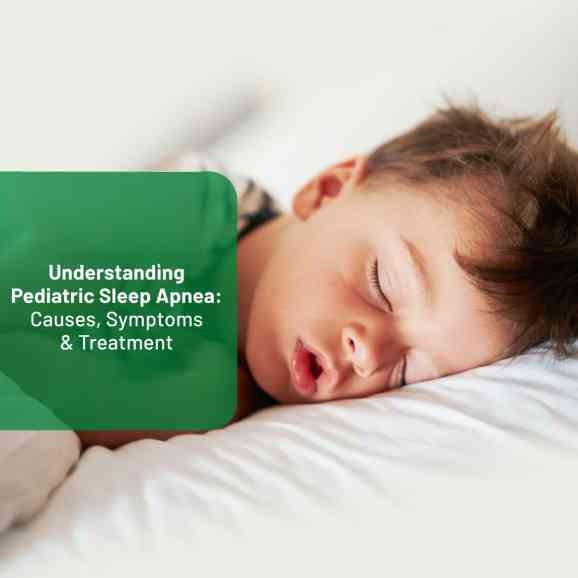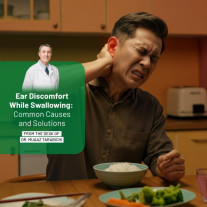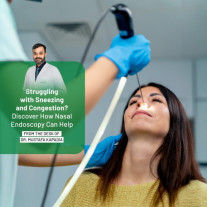Understanding Pediatric Sleep Apnea: Causes, Symptoms & Treatment
Contact Us
Does your child snore at night or wake up feeling tired despite a full night’s sleep? Are they moody, irritable, or having trouble focusing during the day?
While it might seem harmless, these could be warning signs of pediatric sleep apnea a serious but treatable condition that affects children more commonly than many parents realize.
If you’re concerned about your child’s sleep, this guide will help you understand sleep apnea in children, what causes it, what signs to watch for, and how experts at Tarabichi ENT, one of the best ENT clinic in Dubai, can help.
What is Sleep Apnea in Children?
Sleep apnea in children, or pediatric sleep apnea, is a condition where a child’s breathing repeatedly stops and starts during sleep. The word “apnea” literally means a pause in breathing.
These breathing pauses can occur multiple times a night, often due to an obstruction in the airway or a problem in the brain’s control of breathing. Each time this happens, the brain briefly wakes the child up to resume normal breathing disrupting restful sleep without the child even realizing it.
Poor-quality sleep can have a significant impact on a child’s physical, emotional, and cognitive development.
What are the Types of Sleep Apnea in Children?
There are two main types of sleep apnea seen in children:
1. Obstructive Sleep Apnea (OSA)
This is the most common form of sleep apnea in children. It occurs when something physically blocks your child’s airway usually the tonsils or adenoids.
Children with OSA may struggle to breathe, snore loudly, or pause between breaths during sleep.
2. Central Sleep Apnea
In this type, the brain temporarily fails to signal the muscles that control breathing. It is less common in children and is usually linked to neurological or developmental conditions.
Both types require medical attention, especially if your child’s sleep and daytime functioning are affected.
What Causes Pediatric Sleep Apnea?
Multiple factors can lead to sleep apnea in children, including:
1) Enlarged Tonsils and Adenoids
Swollen or enlarged tonsils and adenoids are the leading cause of obstructive sleep apnea in children. These tissues, located in the throat and behind the nose, can block airflow when they grow too large.
2) Obesity
Children with obesity are at higher risk of OSA due to excess fat around the neck and throat area, which can restrict airflow.
3) Genetic or Neurological Conditions
Certain conditions such as Down syndrome, muscular dystrophy, cerebral palsy, and Prader-Willi syndrome can weaken muscle tone in the throat, increasing the risk of sleep apnea.
4) Jaw or Facial Structure
A small jaw or overbite can reduce airway space, contributing to nighttime breathing difficulties.
5) Family History
Children with family members who have sleep apnea are more likely to develop it themselves.
6) Exposure to Smoke
Secondhand smoke from cigarettes can inflame the airways and raise the risk of sleep apnea in children.
Signs and Symptoms of Sleep Apnea in Children
Pediatric sleep apnea often goes undiagnosed because its symptoms can mimic behavioral or emotional issues. Here's what to watch for:
🔹 Nighttime Symptoms
- Loud snoring or noisy breathing
- Gasping, choking, or pauses in breathing
- Restless sleep or frequent awakenings
- Night terrors or sleepwalking
- Mouth breathing while asleep
- Night sweats or excessive perspiration
- Bedwetting (especially in older children)
🔹 Daytime Symptoms
- Morning headaches
- Irritability or mood swings
- Hyperactivity or inattentiveness
- Poor school performance
- Daytime sleepiness or fatigue
- Trouble gaining weight or growing normally
Because some of these symptoms (like hyperactivity or poor focus) are also seen in conditions like ADHD, it’s crucial to rule out sleep apnea through proper diagnosis.
If you notice a combination of these signs, it’s time to consult a pediatric ENT at a trusted center like Tarabichi ENT, one of the best ENT clinics in Dubai for child-focused airway and sleep disorder treatment.
When Should You Be Concerned?
Occasional snoring may not always be a cause for concern, but regular loud snoring, restless sleep, or consistent daytime fatigue is not normal. These symptoms indicate poor sleep quality, which can affect your child’s growth, immunity, learning, and behavior.
If left untreated, pediatric sleep apnea can lead to:
- Learning difficulties
- Behavioral disorders like ADHD
- Delayed growth and development
- High blood pressure
- Heart and lung problems
Early diagnosis and treatment are crucial. At Tarabichi ENT, a team of specialists including some of the best ENT doctors in Dubai can help identify and manage pediatric sleep apnea through comprehensive evaluation.
How is Pediatric Sleep Apnea Diagnosed?
The most reliable way to diagnose sleep apnea is through an overnight sleep study, also called a polysomnogram. This test measures your child’s breathing, brain activity, oxygen levels, heart rate, and sleep stages.
The ENT specialist may also perform:
- A physical examination of the tonsils and adenoids
- Airway imaging (X-rays or endoscopy)
- Medical history review and symptom discussion
Based on the findings, your child’s doctor will create a personalized treatment plan.
What Are the Treatment Options for Pediatric Sleep Apnea?
Treatment depends on the root cause and severity of the sleep apnea. At Tarabichi ENT, known for offering sleep apnea treatment in Dubai, your child may receive one or more of the following options:
✅ Tonsillectomy and Adenoidectomy
This is the most common and effective surgical treatment for children with enlarged tonsils or adenoids. Removal of these tissues can dramatically improve nighttime breathing and eliminate sleep apnea in most cases.
If you're looking for the best pediatric ENT surgeon in Dubai, Tarabichi ENT is home to leading experts in performing safe and successful tonsil and adenoid surgeries.
✅ Weight Management
For overweight children, lifestyle changes involving healthy eating and exercise may be recommended to reduce airway obstruction and improve sleep.
✅ CPAP (Continuous Positive Airway Pressure)
For moderate to severe cases where surgery isn’t an option, your child may benefit from wearing a CPAP mask during sleep. It keeps the airway open by delivering a constant stream of air.
✅ Orthodontic Treatments
Jaw-alignment devices or palatal expanders can help create more space in the upper airway if dental or structural issues are involved.
✅ Allergy Management
In some cases, treating allergies can reduce nasal inflammation and airway blockages contributing to sleep apnea.
Tarabichi ENT provides a holistic, child-friendly approach to ENT care, ensuring families get the highest standard of service from the best ENT specialists in Dubai.
CONSULT THE BEST ENT DOCTOR IN DUBAI
If your child snores loudly, struggles to breathe during sleep, or shows signs of daytime fatigue, crankiness, or trouble concentrating, it could be more than just a passing phase it might be sleep apnea. Pediatric sleep apnea is a serious but treatable condition where a child’s breathing repeatedly stops during sleep, affecting rest and overall health.
At Tarabichi ENT, one of the best ENT clinics in Dubai, experienced pediatric ENT specialists offer comprehensive care to diagnose and treat sleep apnea in children. From identifying the root cause such as enlarged tonsils or adenoids to offering advanced surgical and non-surgical solutions, the team ensures your child gets the highest standard of care. If you're concerned about your child’s sleep, behavior, or school performance, consult the best pediatric ENT doctors in Dubai at Tarabichi ENT for expert evaluation and personalized treatment. Our team of the Best ENT doctors in Dubai, at Tarabichi Healthcare is committed to delivering world-class care with precision and compassion.
Meet our dedicated specialists: Dr. Muaaz Tarabichi, Dr. Michael Timms, Dr. Mustafa Kapadia, Dr. Satish Jain, Dr. Shailesh Khode, Dr. Baher Ashour and Dr. Jamal Kassouma.
We provide minimally invasive treatments tailored to your condition, with a strong focus on safety, accuracy, and long-term results.
For Consultations and Appointments, reach out to us at




